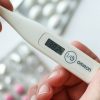
Emergency contraception is a method of birth control you can use if you had sex without using birth control or if your birth control method did not work correctly. You must use emergency contraception as soon as possible after unprotected sex.
Emergency contraception pills are different from the abortion pill. If you are already pregnant, emergency contraception pills do not stop or harm your pregnancy.
Emergency contraception has also been called the “morning-after pill,” but you do not need to wait until the morning after unprotected sex to take it.
Emergency contraception is not meant to be used for regular birth control. Talk to your doctor or nurse about regular birth control to help prevent pregnancy. Nearly half of all pregnancies in the United States are unplanned.
How do emergency contraception pills prevent pregnancy?
Research shows that emergency contraception pills work mostly by preventing or delaying ovulation (the release of an egg from the ovary). Less commonly, emergency contraception may prevent fertilization of the egg by the sperm if ovulation has already happened. If a fertilized egg has already implanted in your uterus (you are pregnant), emergency contraception pills will not stop or harm your pregnancy.
Does emergency contraception have side effects?
Yes, but the side effects are rarely serious. Side effects differ for each woman and may include:
- Headache
- Abdominal pain
- Tiredness (fatigue)
- Dizziness
- Nausea
- Breast pain
The side effects are usually mild and do not last long. Your next period may come early or late, and you may have spotting (light bleeding that happens between menstrual periods).
Does body weight affect how well emergency contraception works for women?
Maybe. Research from the Centers for Disease Control and Prevention shows that ECPs may not prevent pregnancy as often for obese women (with a body mass index, or BMI, of 30 or greater) as for women who are not obese.
Find out your BMI. If your BMI is greater than 30, talk to your doctor or nurse about your risk and your options for emergency contraception.
Will emergency contraception pills affect my next period?
Maybe. After you take an emergency contraception pill, your next period may come sooner or later than normal. Most women will get their period within a week of the expected date. Your period also may be heavier, lighter, spotty, and more or less painful than is normal for you.
If you do not get your period more than one week after expected or if you think you might be pregnant after taking emergency contraception pills, take a pregnancy test to find out for sure.


